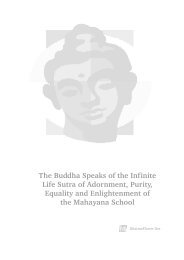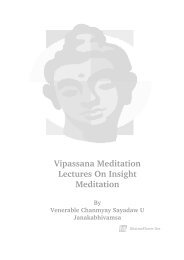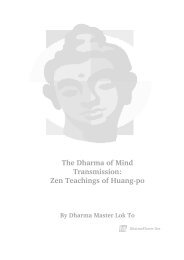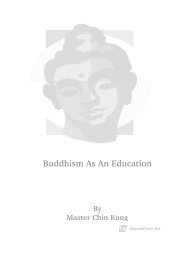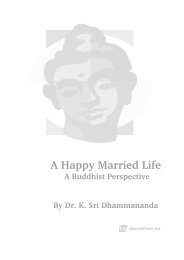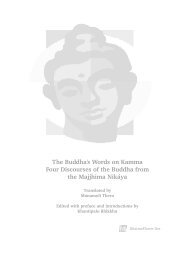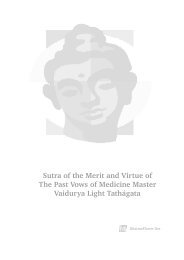THE FOUR NOBLE TRUTHS By Ajahn Sumedho - DharmaFlower.Net
THE FOUR NOBLE TRUTHS By Ajahn Sumedho - DharmaFlower.Net
THE FOUR NOBLE TRUTHS By Ajahn Sumedho - DharmaFlower.Net
You also want an ePaper? Increase the reach of your titles
YUMPU automatically turns print PDFs into web optimized ePapers that Google loves.
not like. Nobody is ever going to like mosquitoes and ants, but we canreflect on the fact that they have a right to live.That is a reflection of the mind; it is not just a reaction:‘Where is the insecticide spray.’ I also don’t like to see ants crawlingover my floor; my first reaction is ‘Where’s the insecticide spray.’ Butthen the reflective mind shows me that even though these creaturesare annoying me and I would rather they go away, they have a right toexist. That is a reflection of the human mind.The same applies to unpleasant mind states. So when you areexperiencing anger, rather than saying: ‘Oh, here I go - angry again!’we reflect: ‘There is anger’. Just like with fear - if you start seeing it asmy mother’s fear or my father’s fear or the dog’s fear or my fear, thenit all becomes a sticky web of different creatures related in some ways,unrelated in others; and it becomes difficult to have any realunderstanding. And yet, the fear in this being and the fear in thatmangy cur is the same thing. ‘There is fear’. It is just that. The fearthat I have experienced is no different from the fear others have. Sothis is where we have compassion even for mangy old dogs. Weunderstand that fear is as horrible for mangy dogs as it is for us.When a dog is kicked with a heavy boot and you are kicked with aheavy boot, that feeling of pain is the same. Pain is just pain, cold isjust cold, anger is just anger. It is not mine but rather: ‘There is pain.’This is a skilful use of thinking that helps us to see things moreclearly rather than reinforcing the personal view. Then as a result ofrecognising the state of suffering - that there is suffering - the secondinsight of this First Noble Truth comes: ‘It should be understood’. Thissuffering is to be investigated.TO INVESTIGATE SUFFERINGI encourage you to try to understand dukkha: to really look at, standunder and accept your suffering. Try to understand it when you arefeeling physical pain or despair and anguish or hatred and aversion -whatever form it takes, whatever quality it has, whether it is extremeor slight. This teaching does not mean that to get enlightened youhave to be utterly and totally miserable. You do not have to haveeverything taken away from you or be tortured on the rack; it meansbeing able to look at suffering, even if it is just a mild feeling ofdiscontent, and understand it.It is easy to find a scapegoat for our problems. ‘If my mother hadreally loved me or if everyone around me had been truly wise, andfully dedicated towards providing a perfect environment for me, then Iwould not have the emotional problems I have now.’ This is really silly!Yet that is how some people actually look at the world, thinking thatthey are confused and miserable because they did not get a fair deal.



